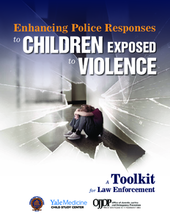Summary
The International Association of Chiefs of Police (The IACP) and the Yale Child Study Center (Yale), with support from the Office of Juvenile Justice and Delinquency Prevention (OJJDP), Office of Justice Programs, U.S. Department of Justice, has launched the Enhancing Police Responses to Children Exposed to Violence: A Toolkit for Law Enforcement. This new toolkit provides practical tools and resources to assist law enforcement agencies in building or enhancing effective operational responses to children exposed to violence (with or without a mental health partner). This toolkit contains tools targeted to police leaders and frontline officers.
When children are not identified, and supported in recovery following exposure to violence, they are at greater risk for:
- School failure
- Mental health disorders such as anxiety, depression, post-traumatic stress disorder (PTSD), and personality disorders
- Substance abuse disorders
- Involvement with the juvenile and criminal justice systems
- Repeated victimization, and perpetration of, sexual and physical violence, and domestic violence
- Perpetration of community violence
- Higher rates of chronic physical illness
- Early death.
Two of the most powerful predictors of the negative and costly long-term outcomes of failures of recovery from traumatic CEV are:
- failure to identify children those children who have been exposed to violence
- absence of adequate social support.
Police officers are frequently the first responders to the situations that pose such powerful threats to the safety and well-being of children and families, and are therefore in an ideal position to both identify children at risk, and initiate the process of recovery for children and families traumatized by violence and other catastrophic events. When police are prepared (through training), equipped and supported (with the toolkit) to help children, families and communities recover and heal from traumatic violence, they are in a stronger position to protect and serve the community.
When police are equipped to provide trauma-informed, developmentally-appropriate responses to children exposed to violence:
- They can create a safe environment to help the child re-establish a sense of security and stability.
- They can play an important role in helping the child and family begin to heal and thrive.
- Childrens’ attitudes towards police can be shaped in the moment, or a seed can be planted to reshape attitudes towards police in the future.
- A foundation of trust between the police, youth, families, and the community is developed.
- When community-police relations are enhanced in this way, improvements in officer safety can be expected.
- Officers feel more effective and satisfied in their work.

